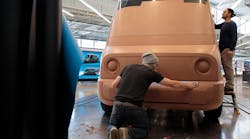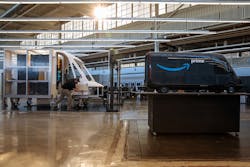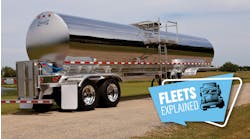The race for perfecting electric last-mile delivery is taking shape. For Amazon and EV-maker Rivian Automotive, it starts with a giant block of clay.
In an industrial complex in suburban Detroit, designers are creating the next generation of battery-electric Amazon delivery vans. The first set of 100,000 vans ordered by Amazon last year is to start delivering packages in 2021.
At Rivian's vehicle development center in Plymouth, Mich., Amazon and the vehicle maker are designing a custom electric vehicle to help Amazon meet its corporate climate pledge to become carbon-neutral by 2040 — 10 years ahead of the international Paris Climate Agreement's goal.
"We're trying to build the most sustainable transportation fleet in the world," Ross Rachey, director of Amazon's global fleet and products, said in a recent Amazon blog post. "It also needs to be the most functional, the highest performing, the safest."
When announcing the deal to work with Rivian last fall, Amazon CEO Jeff Bezos said the Internet giant wants to use its "size and scale to make a difference." And with an equally-giant vehicle order in the works, Amazon and Rivian chose to custom-design a delivery van that will be built at Rivian's Normal, Ill., plant.
That custom-design work in Michigan included sculptors smoothing the edges of full-size clay vehicle models that provide a physical representation of what the vehicles will look like for production. In another room, drivers step into a virtual reality that simulates the driver experience in the new vans, which will come in three sizes and support multiple battery capacities for specific delivery routes.
The Amazon Logistics division delivered about 3.5 billion packages globally in 2019 as the online retailer continued to cement itself as a carrier rival to UPS and FedEx. While Amazon still uses UPS and the United States Postal Service to deliver its goods, it is handling nearly half of its deliveries, according to industry estimates.
UPS just announced it is taking a minority stake in EV-maker Arrival that comes with 10,000 custom-made brown delivery vans for the world's largest for-hire carrier. Like Amazon and Rivian, UPS and UK-based Arrival are working together to design the electric-powered vans to be deployed on North American and European roads over the next four years.
FedEx, which has been working on its own electric delivery vehicle network with Ryder Systems and Chanje, did not renew its Amazon contract in 2019."We are focused on driving efficiency into every aspect of the vehicle design — everything from cabin heating to driver ergonomics to drivetrain design has been optimized for time and energy," R.J. Scaringe, CEO of Rivian, said in the Amazon blog post. "And then the echo effect of this, of causing other logistics players in this space to also look at how they drive up efficiency within their fleet, will have a very large impact."
The Amazon vehicles will include advanced safety technology and features: automated emergency braking, front-wheel and all-wheel drive options, lane-keep assist, a pedestrian warning system, traffic design recognition, and an automatic warning system that detects and alerts distracted driver behavior.
The design also integrates Amazon technology. That includes a digital instrument cluster and central display screen integrated with Amazon's logistics management, along with routing and package delivery technology systems to make it easier for the drivers to focus on operating the vehicle. The system removes the need for extra devices that provide address and mapping information. The vans will also feature Amazon Alexa to make it easy for drivers to ask for help or use simple voice commands in the cargo bay when sorting packages without manually enter commands or consult handheld devices.
Amazon plans to have 10,000 of these Rivian vans delivering packages as early as 2022 — and all 100,000 on the road by 2030.





